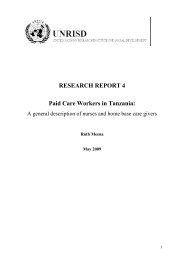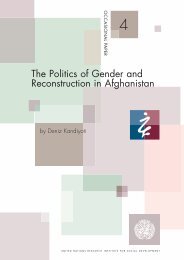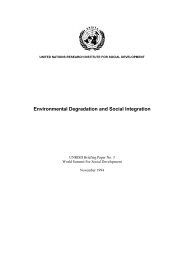Beyond Pragmatism: Appraising UN-Business Partnerships
Beyond Pragmatism: Appraising UN-Business Partnerships
Beyond Pragmatism: Appraising UN-Business Partnerships
You also want an ePaper? Increase the reach of your titles
YUMPU automatically turns print PDFs into web optimized ePapers that Google loves.
<strong>UN</strong>RISD PROGRAMME ON MARKETS, BUSINESS AND REGULATION<br />
PAPER NUMBER 1<br />
An important element that is often marginalized in definitions and analysis of partnership<br />
relates to participation and empowerment. Rein et al. (2005:123) suggest that partnerships<br />
should be viewed as enabling devices to give voice to different stakeholders:<br />
[P]artnerships are more to do with the provision of legitimate platforms for<br />
problem solving and access to resources and less about ‘delivery’…What is<br />
important is how partnerships ensure that different voices are heard clearly<br />
and equitably, so that ‘working together’[ 27 ] to address development issues is<br />
made more inclusive and sustainable.<br />
Weihe (2006), referring to the nebulous concept of partnership and the confusion that reigns in<br />
much of the discussion, refers to five different sets of literature or research traditions in the<br />
study of partnerships, with cross-cutting interconnections, that could contribute to greater<br />
clarity. These comprise<br />
1. the local (urban) regeneration approach;<br />
2. the policy approach that describes and analyses public-private constellations<br />
within particular fields of policy (such as nuclear power, health or education);<br />
3. the infrastructure approach that analyses public-private financial arrangements<br />
for the development of infrastructure;<br />
4. the development approach, where the focus is on public-private partnerships<br />
aimed at fostering development and development-related policy issues (such as<br />
dealing with environmental challenges or poverty alleviation); and<br />
5. the governance approach, which is more wide-ranging than the previous<br />
categories since it focuses on relational, institutional and organizational aspects of<br />
new ways of governing.<br />
These approaches have different understandings of the concept of public-private partnership<br />
and generally refer to different practices, and to some extent emerge from different contexts and<br />
experiences. As such, they serve as useful, even necessary, reference points for discussion and<br />
analysis of partnerships. 28<br />
The above brief overview suggests that unless the <strong>UN</strong>’s partnering work is founded on greater<br />
conceptual clarity and more analytical frameworks, it will be difficult to make useful<br />
comparisons or draw appropriate conclusions that can be applied in the Global Compact and<br />
elsewhere. Moreover, greater analytical rigour is also essential in order to develop appropriate<br />
tools for monitoring and evaluation, without which there is a danger that <strong>UN</strong> partnering will<br />
lose credibility and legitimacy.<br />
Growing numbers across the <strong>UN</strong> spectrum<br />
For the reasons outlined in part 1, it is hardly surprising that the number of entities described as<br />
<strong>UN</strong>–business partnerships has grown considerably in recent years. The Global Compact itself,<br />
established to promote more responsible behaviour on the part of business by encouraging the<br />
adoption and implementation of nine principles—now extended to 10—considers itself to be a<br />
<strong>UN</strong>–business partnership. 29 Its business participants now number over 2,500 companies (of<br />
which 106 are among the FT [Financial Times] Global 500) (see <strong>UN</strong> Global Compact 2006a).<br />
While the Global Compact Office has, from the start, encouraged closer relations between the<br />
27<br />
28<br />
29<br />
This study of selected partnerships in Southern Africa notes that in some of the region’s languages, partnership is translated as<br />
“working together”.<br />
<strong>UN</strong> personnel charged with promoting and establishing partnerships with the private sector, and those contributing to efforts to<br />
develop impact assessment of partnerships, could benefit from documentation that sets out the development of these traditions and<br />
the key issues associated with them, and with references to key conceptual and analytical works.<br />
By participating in the Global Compact, businesses commit to “embrace, support and enact, within their sphere of influence, ten<br />
principles that concern human rights, labour standards, the environment and preventing corruption” (www.unglobalcompact.org/<br />
AboutTheGC/TheTenPrinciples/index.html, accessed in August 2006).<br />
12
















